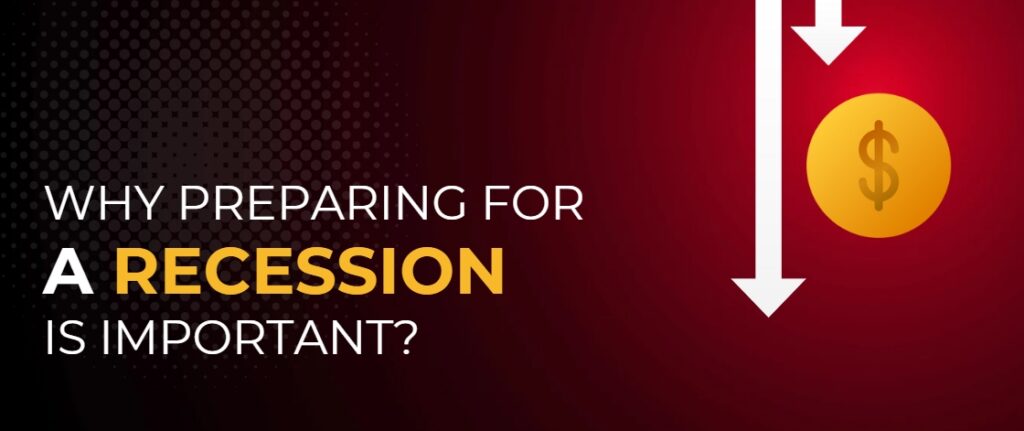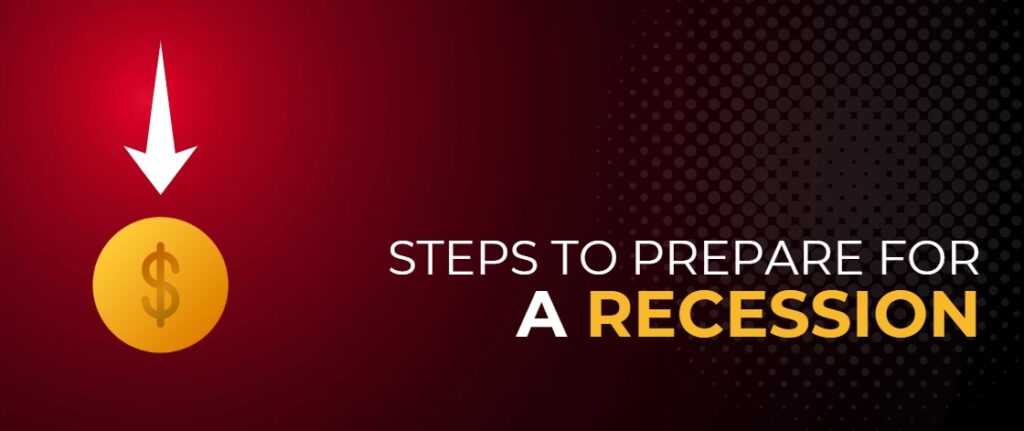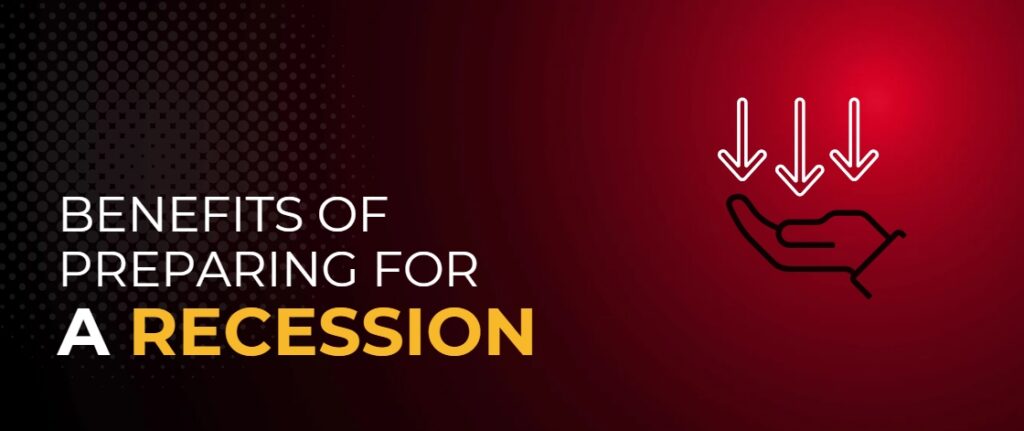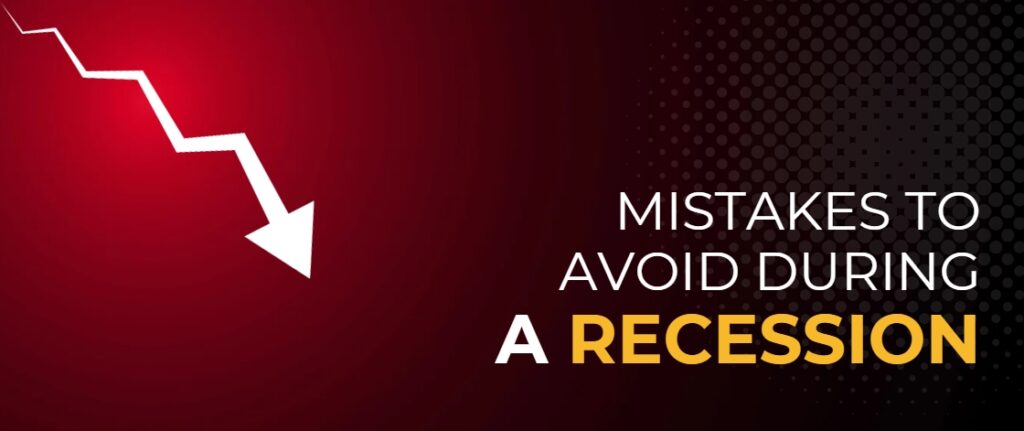A recession is a period of considerable economic deterioration, often characterized by a reduction in GDP for two or more consecutive quarters.
Economic activity slows during a recession, firms may suffer, unemployment may rise, and consumer spending may fall.
So, should we prepare ourselves for a recession or not?
Or should we wait for the recession to come over and then start preparing for it?
Recession is like a storm, which we can forecast and prepare for, or like a tornado, which comes without warning and destroys everything.
In this blog, we’ll discuss whether we should plan for a recession or not. We would also share insights and practical recommendations on how to protect our financial well-being during economic downturns. At the conclusion of this blog, you’ll have a better grasp of the benefits of recession readiness as well as specific actions to assist you during an economic downturn.
Let us start by understanding the signs of a recession.

Signs Of A Recession
These are some crucial indicators of a possible recession:
- A Fall In Gross Domestic Product (GDP)- Falling GDP is one of the most important signs of a prospective recession. When a country’s GDP falls for two consecutive quarters, it is said to be in a recession.
- Increasing Unemployment- When more individuals lose their jobs or are unable to find work, it is generally a harbinger of an impending economic collapse. As individuals have less money to spend, demand for products and services falls, exacerbating the financial crisis.
- Reduced Industrial Production- When corporations produce less, it is frequently an indication that demand for their products is weakening. Reduced industrial production might also lead to layoffs and lower consumer expenditure.
- Decline In Stock Market- This is generally regarded as a forerunner to a recession. When investors perceive the economy falters, they tend to sell equities, creating a negative spiral that can further undermine the economy.
- Rising Inflation- While not necessarily a direct cause of a recession, rising inflation can indicate underlying economic imbalances that eventually lead to a slump. Customers may reduce spending when prices rise too rapidly, resulting in slower development.
Overall, it’s critical to monitor various economic indicators to get a sense of the economy’s health. As they say, precaution is better than cure.
Let us now look at why it’s necessary to plan for a recession.
If you need some ideas about what to read next, here they are:
- The Impact of Geopolitical Tensions on the Global Economy and the Risk of a Recession
- Fiduciary vs Non-Fiduciary Accounts: Differences & How They Impact The Investors’ Financial Decisions
- Avalanche & AVAX: Current & Past Market Performance, Investment Potential in 2023, & Future Outlook

Why Preparing For A Recession Is Important?
It is critical to plan for a recession since economic downturns may considerably impact individuals, families, and companies. Job losses and lower income can make it difficult to pay expenses and maintain a decent level of life during a recession.
Thus, preparing for a recession is vital due to the following factors:
- Economic Downturns Are Unavoidable- The economic cycle is characterized by periods of growth and contraction and a recession is part of this natural business cycle. Thus, if you cannot avoid something, then it’s better to be prepared for it.
- Financial Security- Planning for a recession can assist people and companies in weathering economic downturns. Those who have an emergency fund or savings can prevent being caught off guard by sudden job losses, income decreases, or market volatility.
- Keeping Your Investments Safe- During recessions, the stock market can be volatile and cause significant losses. But by diversifying investments and preparing for market fluctuations, investors can minimize the impact of a recession on their investments.
The preparation, as mentioned above, could be a game changer for Individuals and organizations. All this can reduce the effect of a recession by planning ahead of time. By being proactive, one may better shield themselves from the negative consequences of a recession and position themselves to recover once the economy begins to revive.
Now, let’s look at some actions you might take to prepare for the impending recession.

Steps To Prepare For A Recession
You cannot control the economy at large, but you can take steps to help you survive. Here are some steps to help you out.
- Make A Budget And Cut Expenses- One of the most effective methods to prepare for a recession is to examine your finances and develop a budget. Look for places where you may decrease costs and eliminate wasteful expenditures.
- Create An Emergency Fund- Having an emergency fund is usually a smart idea in case of unforeseen costs or job loss. Put aside some money each month to create a buffer to assist you in getting through difficult times.
- Pay Off Your Debts- Lowering your debt load will help you weather a recession better. Pay off high-interest debt first, then consider debt consolidation to make your bills more affordable.
- Diversify Your Income- If you rely solely on one money source, consider diversifying your revenue sources. Starting a side business or doing freelance work to augment your primary income might be the best examples here.
- Invest Wisely- If you have investments, you should check them on a regular basis and make modifications as needed. Consider diversifying your investments and avoiding high-risk investments that may be volatile in the market.
- Maintaining A Healthy Lifestyle- This can help you remain resilient in the face of economic instability. One should prioritize exercise, proper food, and stress-reduction measures such as meditation or counseling.
These preparations would provide you with multiple benefits, such as those listed in the next section.

Benefits Of Preparing For A Recession
Preparing for a recession can help you improve your financial situation. You can improve your cash flow and reduce financial stress by paying off debt, building an emergency fund, and reducing unnecessary expenses. The following are the benefits of preparing for a recession:
- Better Career Prospects- The ability to weather a recession and emerge with improved career prospects may be enhanced by diversifying your income and developing new skills. In order to do this, you can explore new career paths within your field or explore new ones altogether.
- Multiple Investing Opportunities- Stock prices, real estate values, and other investments may decrease significantly during a recession. You may be able to purchase assets at a discount if you prepare for a recession and save money.
- Better Resilience- Prepare for recessions by increasing your resilience and ability to handle difficult situations. Even in the face of challenges, you can maintain a positive attitude and stay focused on your goals.
- Reduced Stress And Anxiety- Financial stress can lead to significant anxiety and stress. You can reduce this stress and experience greater peace of mind by preparing for a recession and improving your financial position.
- Long-Term Financial Health- Preparing for a recession can help you establish good financial habits. It is possible to create a foundation for financial success that will last well beyond any recession by saving, budgeting, and reducing debt.
Recession may turn out to be unusual in the economy, and it may harm our lives, but these are the benefits of preparing for it.
In the next paragraph, we will outline the mistakes to avoid when planning for a recession.

Mistakes To Avoid During A Recession
Preparing for emergencies during an economic downturn will help you avoid putting your finances at risk. The following are some common mistakes you should avoid:
- Taking On Additional Debt- While recessions may cut loan interest rates, avoid taking on more debt. Instead, concentrate on paying off any existing debt.
- Being A Cosigner- If the principal loan holder fails to make a payment, the cosigner is held liable. Avoid cosigning to avoid incurring further debt.
- Panicking- If unexpected changes cause anxiety, take a deep breath and wait for an upswing. If you are unsure about economic changes, consult a financial expert.
- Taking Your Work For Granted- Whether you want to stay at your employment for a long time or not, consistently demonstrate your abilities. During a downturn, emphasize these talents and hold off on resigning until another chance exists.
- Not Putting Money Aside For An Emergency- You may require additional revenue to cover regular expenses and unforeseen situations. Create an emergency fund that can cover three to six months of your costs.
When times are tough, it is a good idea to ensure preparations are never avoided; Remember that taking small measures now might lead to enormous results later.
In the final section, we will give you an investment alternative that can help your portfolio combat recession.
The Bottom Line
While you cannot forecast the economy’s future with certainty, planning for a possible recession is always prudent. You may boost your resilience and lessen your financial stress by improving your financial situation, cutting spending, developing an emergency fund, and diversifying your revenue streams. Preparing for a recession can be a stress buster for you as by the time recession knocks on your door, you will already be ready.
An investment alternative with the finest strategies & risk management protocols is there to help you in this economic downturn. Secvolt, a quant hedge fund, has been breaking all the records with its exceptional 262.10% YTD returns in 2022. Don’t put off taking action to better your financial situation until it’s too late. Begin now by making a budget, paying off debt, saving for an emergency, and getting in touch with Secvolt. By taking proactive actions today, you may increase your financial stability and be better prepared for future economic problems. Remember, as they say, ‘Those who sweat in peace do not bleed in war!’
Join Our Newsletter
Elevate your financial game & join the ranks of elite investors with Secvolt’s exclusive newsletter.
Join Our Newsletter
Elevate your financial game & join the ranks of elite investors with Secvolt’s exclusive newsletter.
Don’t just dream of wealth; achieve it with Secvolt. Schedule a call today for personalized guidance on your investment strategy and join the ultra-successful.
Ready to unlock your wealth’s truest potential & cherish affluence?
Secvolt, our hedge fund, sets the bar high with a record-breaking performance of 262% returns in 2022. With the brilliance of our highly advanced quant models and the efficiency of our risk mitigation protocols, we are yet to see a loss!
We’re the perfect ally to help you succeed financially and build the lasting legacy you have always aspired for.
Get in touch today. YOUR LEGACY AWAITS YOU…






